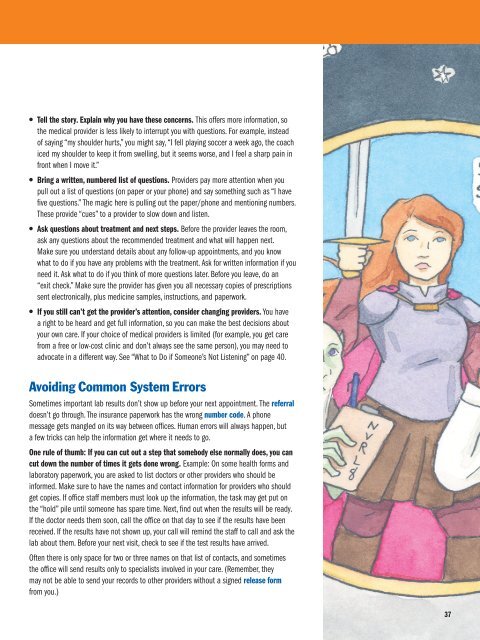Look Inside Young Adult Road Map
You also want an ePaper? Increase the reach of your titles
YUMPU automatically turns print PDFs into web optimized ePapers that Google loves.
l Tell the story. Explain why you have these concerns. This offers more information, so<br />
the medical provider is less likely to interrupt you with questions. For example, instead<br />
of saying “my shoulder hurts,” you might say, “I fell playing soccer a week ago, the coach<br />
iced my shoulder to keep it from swelling, but it seems worse, and I feel a sharp pain in<br />
front when I move it.”<br />
l Bring a written, numbered list of questions. Providers pay more attention when you<br />
pull out a list of questions (on paper or your phone) and say something such as “I have<br />
five questions.” The magic here is pulling out the paper/phone and mentioning numbers.<br />
These provide “cues” to a provider to slow down and listen.<br />
l Ask questions about treatment and next steps. Before the provider leaves the room,<br />
ask any questions about the recommended treatment and what will happen next.<br />
Make sure you understand details about any follow-up appointments, and you know<br />
what to do if you have any problems with the treatment. Ask for written information if you<br />
need it. Ask what to do if you think of more questions later. Before you leave, do an<br />
“exit check.” Make sure the provider has given you all necessary copies of prescriptions<br />
sent electronically, plus medicine samples, instructions, and paperwork.<br />
l If you still can’t get the provider’s attention, consider changing providers. You have<br />
a right to be heard and get full information, so you can make the best decisions about<br />
your own care. If your choice of medical providers is limited (for example, you get care<br />
from a free or low-cost clinic and don’t always see the same person), you may need to<br />
advocate in a different way. See “What to Do if Someone’s Not Listening” on page 40.<br />
Avoiding Common System Errors<br />
Sometimes important lab results don’t show up before your next appointment. The referral<br />
doesn’t go through. The insurance paperwork has the wrong number code. A phone<br />
message gets mangled on its way between offices. Human errors will always happen, but<br />
a few tricks can help the information get where it needs to go.<br />
One rule of thumb: If you can cut out a step that somebody else normally does, you can<br />
cut down the number of times it gets done wrong. Example: On some health forms and<br />
laboratory paperwork, you are asked to list doctors or other providers who should be<br />
informed. Make sure to have the names and contact information for providers who should<br />
get copies. If office staff members must look up the information, the task may get put on<br />
the “hold” pile until someone has spare time. Next, find out when the results will be ready.<br />
If the doctor needs them soon, call the office on that day to see if the results have been<br />
received. If the results have not shown up, your call will remind the staff to call and ask the<br />
lab about them. Before your next visit, check to see if the test results have arrived.<br />
Often there is only space for two or three names on that list of contacts, and sometimes<br />
the office will send results only to specialists involved in your care. (Remember, they<br />
may not be able to send your records to other providers without a signed release form<br />
from you.)<br />
37














